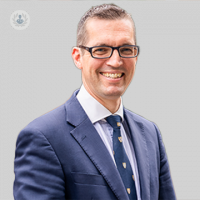Changing lives via retzius sparing technique for prostate cancer
Written by:Many men will undergo a prostate removal for one reason or another, one of the reasons being prostate cancer. In all cases, patients want to be able to return to their normal lives as best and as soon as possible. Inspired consultant urologist, Mr Philip Charlesworth, gives us a clear description as to why the newer rezius sparing technique is the ideal procedure for treating prostate cancer.

How are prostate removals more commonly done?
In a traditional robotic surgical removal of the prostate, the instruments come in at quite a wide angle and the bladder and the front of the prostate are approached. All the supporting structures and continence structures are included in playing a role, some of these being the bladder supports and ligaments on top of the prostate. This is the approach that we've used for many, many years.
How does the retzius sparing technique differ?
Now, retzius sparing is about sparing that area, that is called the space of retzius. If you spare that, you spare having to divide the supporting structures for the continence, for the sphincters, for the ability to then get early recovery of your continence after you've had your prostate removed.
How is the retzius sparing technique done?
The way that we do that is by coming underneath the prostate to start with. Next, we define where the erectile nerves are and we define where the prostate is. Then, we work our way up and round, shelling the prostate out and off the rectum, taking the cancer out. This allows us to leave all those important structures on top of the prostate and on top of the sphincter intact.
What is recovery like after the procedure?
Many patients nowadays that have retzius sparing recover a few days later when the catheter comes out. There is very little in the way of constant incontinence. As there is very little in the way of leakage, patients hardly have to use any pads and are often massively surprised about how quickly that is.
Now, clearly there will still be some patients that will struggle and need some rehab and need some support. Actually, when you look at the population of patients that have the retzius sparing procedure compared to having an anterior approach, the patients do better and get their continence back earlier. This has been proven on randomised control trials, and we are about to start another one to prove it still further
Why does this matter?
I think that the recovery results are really important. It's something I'm so passionate about because it matters. These patients I operate on want to get their lives back. They want to get back to work. They want to get back to their exercise and their sport. They want to get back on their bikes or go running. And the drier you are, the more control you have and the happier you are. And that has got to be good.
If you are experiencing prostate concerns and would like to see if the retzius sparing procedure is best for you, you can schedule a consultation on Mr Charesworth's Top Doctors profile.


